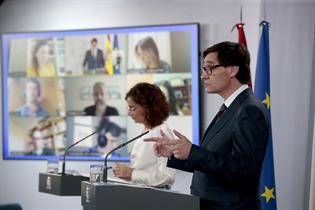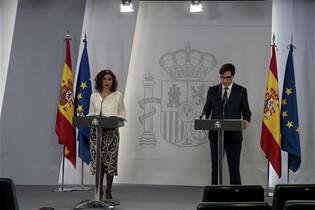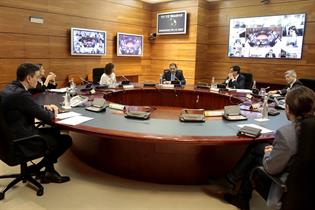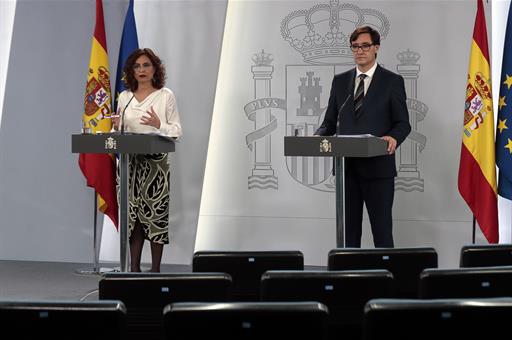Extraordinary Council of Ministers. Coronavirus COVID-19
Government approves extension of state of emergency to 10 May
Council of Ministers - 2020.4.24
Moncloa Palace, Madrid
The Council of Ministers approved, after receiving the authorisation of the Lower House of Parliament on Wednesday, the Royal Decree extending the state of emergency, for the third time since it was initially declared on 14 March to control the health crisis. The new term will end at midnight on 10 May.
The Minister for the Treasury and Government Spokesperson, María Jesús Montero, considered that the context in which this new extension takes place is "encouraging" given the figures on the spread of the pandemic at an epidemiological and healthcare level.
Despite the buoyant figures, "we must not let our guard down", said María Jesús Montero, who asked people to continue respecting social distancing and hygiene measures. "The exemplary collective effort made by Spanish society, its discipline and civic spirit are allowing us to make daily progress in fighting the virus".
More people cured than new infections
 Fotos: Pool Moncloa/JM CuadradoThe Minister for Health, Salvador Illa, underlined that the figures announced on Friday show that, for the first time, the number of people cured over the last 24 hours - 3,105 - is higher than the number of new infections in the same period - 2,796. "Since more people have recovered than have been infected, this means we have now flattened the curve", he stressed.
Fotos: Pool Moncloa/JM CuadradoThe Minister for Health, Salvador Illa, underlined that the figures announced on Friday show that, for the first time, the number of people cured over the last 24 hours - 3,105 - is higher than the number of new infections in the same period - 2,796. "Since more people have recovered than have been infected, this means we have now flattened the curve", he stressed.
The minister recalled that on 14 March, when the government decreed the state of emergency, the percentage increase in new infections was higher than 35%, whereas it now stands at 1.4%. He also indicated that the figure for the number of deaths is falling, having stood at 367 on Friday, the lowest in a month.
Salvador Illa highlighted than in nine autonomous regions - Asturias, the Balearic Islands, Cantabria, Extremadura, Galicia, Murcia, Navarre, La Rioja and the Canary Islands - fewer than 10 people have died in the last 24 hours.
Notwithstanding this, the minister called for "prudence and caution", because many aspects of the virus are still unknown and it would be irresponsible not to act with all due prudence.
Asymmetrical de-escalation
The minister announced that on Friday afternoon he will propose to regional health councillors the criteria and markers set by the government to return to normality: the level of healthcare capacity, epidemiological monitoring, early identification of the treatment of potential new cases and collective protection measures to avoid new infections.
Based on these criteria and suggestions from regional health councillors, he argued, the government will address the transition phase, in which the different epidemiological situations of the various regions of the country will be taken into consideration. "The process will be asymmetrical, and not necessarily by territorial units equivalent to autonomous regions", he underlined.
As regards the start of this de-escalation phase, Salvador Illa declared that he cannot yet announce any date or timeframe.
Measures to alleviate lockdown
The Minister for Health recalled that as from Sunday, between 9 in the morning and 9 in the evening, children up to the age of 14 will be allowed to go for a walk of up to one hour a day, accompanied by an adult and without going more than one kilometre away from home.
Salvador Illa stated that no measures are provided for other groups or sectors, but this will be evaluated according to the spread of the epidemic to see whether they can be adopted, as and when the state of emergency so permits.
Maximum cost of face masks
The minister recalled that on Thursday, the Official State Gazette published an Order setting the maximum price for surgical masks at 0.96 Eurocents per unit (VAT inclusive) and also of certain gels and sanitising liquids. In this regard, he announced that the government will monitor price trends to avoid abusive practices. This regulation may be modified if necessary.
Study on seroprevalence
The minister clarified that the study on seroprevalence to detect the real number of people infected by the coronavirus in Spain, and the degree of immunity of the population will begin on Monday in almost all regions, while it will not be necessary to wait for the final results to begin the transition phase.
Regional and local spending
 Pool Moncloa/JM CuadradoThe Minister for the Treasury announced that the government has authorised the regional governments to take on such spending commitments as are necessary to cater for the healthcare needs stemming from the pandemic. Furthermore, local authorities are authorised to use any surpluses in the fight against the coronavirus in the way defined by the government together with the Spanish Federation of Municipalities and Provinces (Spanish acronym: FEMP).
Pool Moncloa/JM CuadradoThe Minister for the Treasury announced that the government has authorised the regional governments to take on such spending commitments as are necessary to cater for the healthcare needs stemming from the pandemic. Furthermore, local authorities are authorised to use any surpluses in the fight against the coronavirus in the way defined by the government together with the Spanish Federation of Municipalities and Provinces (Spanish acronym: FEMP).
María Jesús Montero also declared the government's intention to present the Minimum Living Income in May - "an innovative guarantee of income, for the first time in our country, which will affect about 1 million people".
Agreement on socio-economic reconstruction
The Government Spokesperson stressed that collaboration and responsibility are essential to overcome this pandemic. In this regard, she hailed the disposition of political parties, regional governments, local authorities and social stakeholders to push through the socio-economic reconstruction, which the President of the Government observed in the meetings he has held with them as from 16 April.
The government has proposed, as a starting point, to strengthen the health system, the social protection system and the Welfare State, to reactivate the economy and forge a consensus on Spain's position in Europe. "We believe that these are the measures on which there will be the greatest degree of consensus and where we need to forge an alliance", declared María Jesús Montero.
The minister stressed that these issues are not exclusionary and will need to be "enriched" by proposals from all participants. "The agreement will only be reached if we truly guarantee that we all feel represented in the results, and hence we will all need to give a little ground so that the country comes out on top".
María Jesús Montero called to "put those matters that separate us to one side and focus on what unites us", which must be an effort to guarantee the general interest and collective well-being.
More Europe
 Pool Moncloa/JM CuadradoThe Government Spokesperson also called for agreements at an international level, specifically through the European Union, to alleviate the effects of the economic crisis. "Now, more than ever, we need more Europe".
Pool Moncloa/JM CuadradoThe Government Spokesperson also called for agreements at an international level, specifically through the European Union, to alleviate the effects of the economic crisis. "Now, more than ever, we need more Europe".
The minister explained that the European Council, which met on an extraordinary basis on Thursday, favourably welcomed the proposal made by the President of the Government, Pedro Sánchez, to create a European Reconstruction Fund of 1 to 1.5 trillion euros. The specific figure will be proposed by the European Commission in May.
Spain advocates, continued the minister, that this money reaches Member States through transfers and not loans because "this would prevent some countries becoming over-indebted and facilitate a much fairer way out of this crisis".
The government is also in favour of creating "a triple safety net" for workers, companies and independent contractors, said María Jesús Montero, through a European unemployment insurance scheme with a provision of 100 billion euros, the mobilisation of 200 billion euros through the European Investment Bank and lines of liquidity through the European Stability Mechanism.
María Jesús Montero expressed her confidence in the European Union addressing an "ambitious" reconstruction plan "at the level our citizens deserve" and said the President of the Government, Pedro Sánchez and the government are committed to working "tirelessly" to this end.
Non official translation





